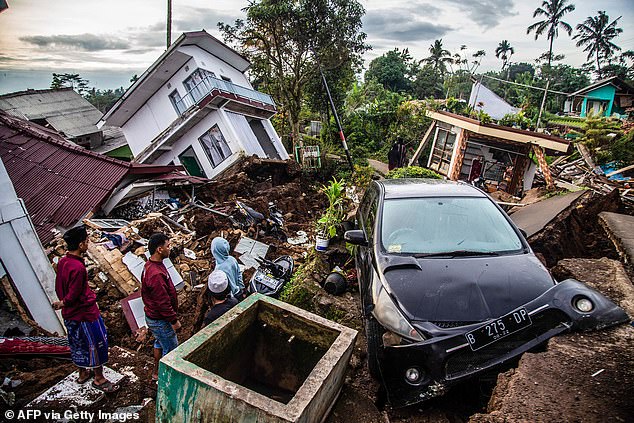
The death toll from a devastating earthquake that hit Indonesia’s main island has risen to 252 today.
The number of people killed in the earthquake may still rise further, as rescuers continue in their desperate search for survivors in the rubble of buildings that collapsed after the quake struck the island of Java.
At least 30 people are still missing while 377 are injured after the shallow tremor hit West Java near the city of Cianjur, around 45 miles south of the capital Jakarta on Monday afternoon.
Excavators, trucks and other heavy equipment sent overnight reached Cianjur by Tuesday morning.
The magnitude 5.6 quake triggered a landslide and collapsed buildings in hard-hit Cianjur – where most of the deaths were reported – but also shook tower blocks in Jakarta for three terrifying minutes as people rushed on to the streets.
There are fears that dozens more people are buried under the rubble of collapsed building, as rescuers today desperately tried to find them.
One survivor from Cianjur said that her building started ‘shaking like it was dancing’ when the shallow tremor hit at 1.21pm local time on Monday.
‘I was crying and immediately grabbed my husband and children,’ said the woman, who gave her name only as Partinem. The house collapsed shortly after she escaped with her family.
‘If I didn’t pull them out we might have also been victims,’ she said, gazing over the pile of concrete and timber rubble.

Villagers salvage items from damaged houses following a 5.6-magnitude earthquake that killed at least 252 people in Cianjur on Tuesday
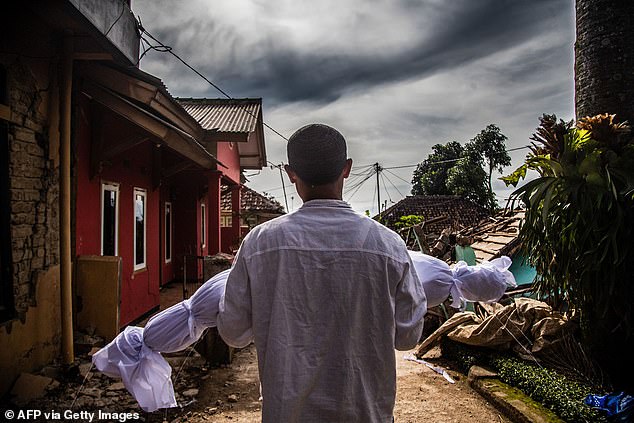



A villager carries the body of his dead son following a 5.6-magnitude earthquake in Cianjur on Tuesday
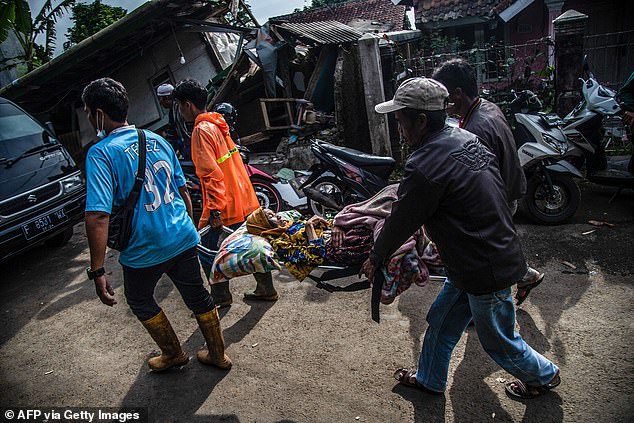





Villagers carry an injured victim following the earthquake in Cianjur on Tuesday. At least 900 were hurt in the quake
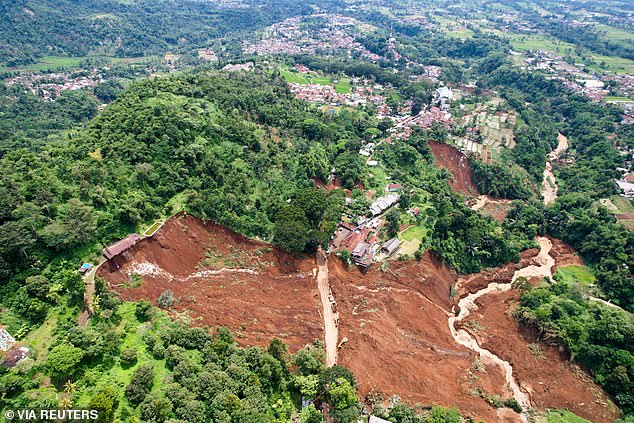





An aerial view of an area affected by landslides following earthquake hit in Cianjur, West Java province, Indonesia, on Tuesday
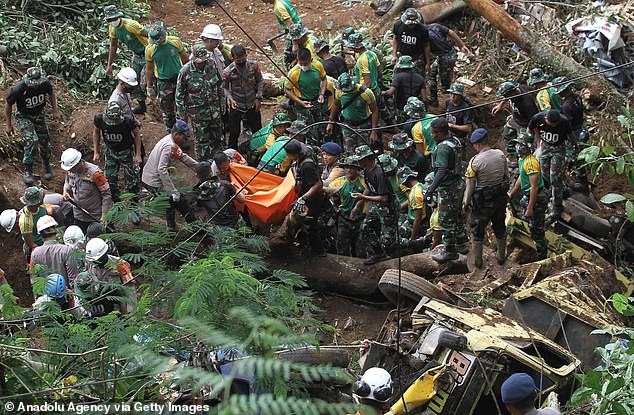





Joint SAR team members evacuate a victim of a landslide due to the Magnitude 5.6 earthquake in the Cugenang Village of Cianjur on Tuesday
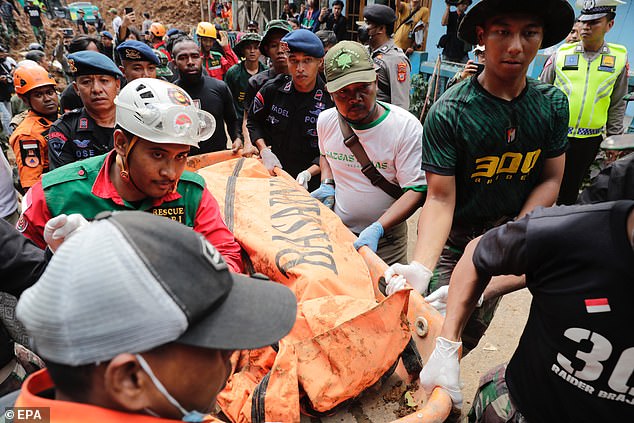





Indonesian military and rescue personnel evacuate the body of a victim from a landslide caused by a 5.6 magnitude earthquake, in Cianjur, on Tuesday
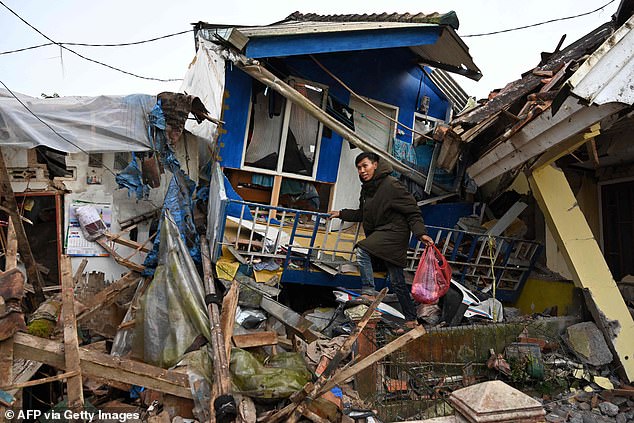





A man salvages items from a damaged house as he walks amongst the rubble in Cianjur on Tuesday
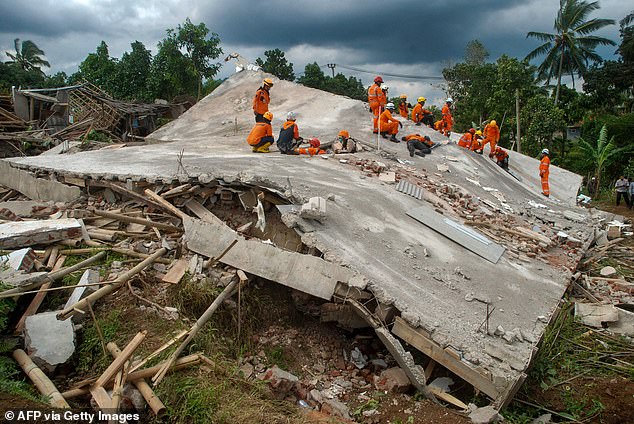





Rescue workers look for victims under the ruins of collapsed buildings in Cianjur on Tuesday
The local government today updated their death toll from 162 to 252 people killed following the earthquake.
The authorities also reported that 377 were injured, while the number of people displaced has reached 7,060. Yesterday, officials has said another 600 people suffered minor injuries following the quake.
In the village of Cijedil, northwest of Cianjur, the quake triggered a landslide that blocked streets and buried several houses, and there were reports that 25 people were still buried, said Henri Alfiandi, the chief of the National Search and Rescue Agency.
‘We are maximizing operations at several points where it is suspected that there are still casualties. Our team is also trying to reach remote areas,’ he said.
‘For us, all victims are a priority, our goal is to find them and save lives by getting them evacuated as soon as possible and get medical help.’
Shallow quakes tend to be more destructive than deeper earthquakes because deeper quakes travel further to the surface, losing energy along the way.
Aris, a 45-year-old, is among desperate locals waiting to see if the rescuers will find their loved ones.
Aris spent hours walking to the district of Cugenang where his relatives lived until disaster struck on Monday. An excavator is now working its way through mounds of home and Aris hopes that it might uncover some trace of his loved ones.
‘When I got here, nothing was left. Everything was buried,’ Aris said, gesturing at a huge mound of brown earth where his brother’s home had stood.
‘I am here because I need to find my family, my sister-in-law. She was buried under this landslide. There were three: the mother and two children,’ Aris said.
His brother was missing nearby area, he said.
More than 24 hours after the quake struck, emergency workers were racing to pull victims from the rubble of buildings and clear areas cut-off by landslides, with officials saying dozens were missing.
Recovery efforts were complicated by power cuts and damaged roads over a large area, officials said.
With hospitals already overwhelmed, patients lay on stretchers and cots in tents set up outside, with intravenous drips in their arms as they awaited further treatment.
Herman Suherman, a local, said 20 deaths and 300 injuries had been counted in a single hospital – and that toll is likely to rise as more buildings are searched.
Many of the dead were public school students who had finished their classes for the day and were taking extra lessons at Islamic schools when the buildings collapsed, West Java Governor Ridwan Kamil said.
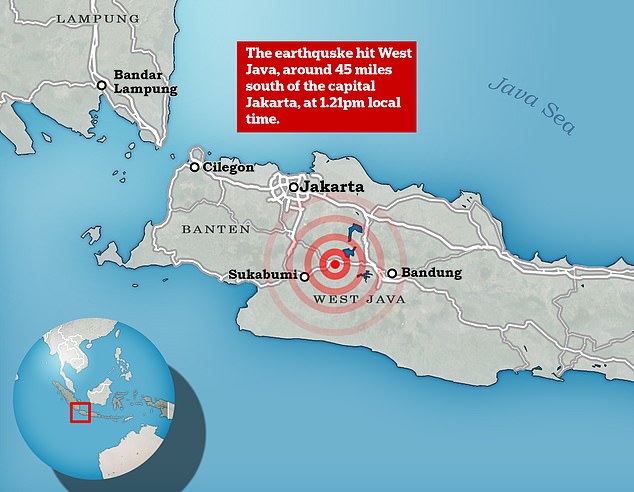





The quake’s epicentre was a few miles to the west of Cianjur, which seems to be the worst-hit town, but also caused high-rise buildings to shake in the capital Jakarta
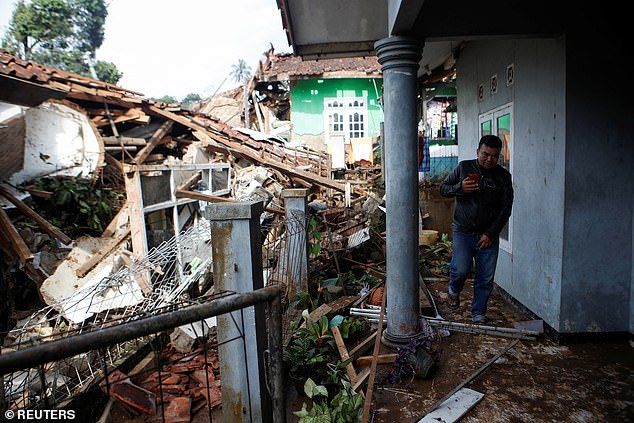





A man inspects his house that got destroyed in the earthquake, in Cugenang, Cianjur, on Tuesday
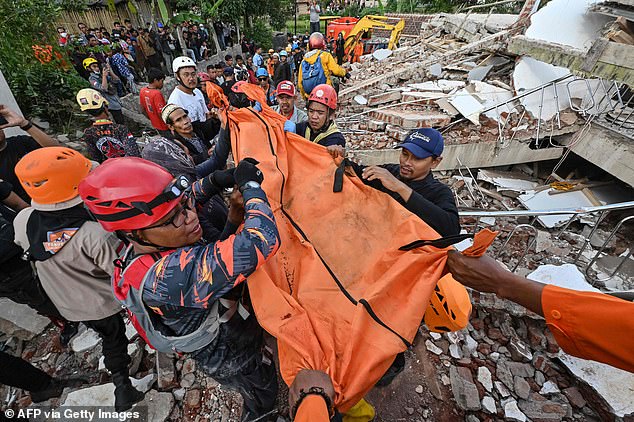





Rescue workers carry the body of a victim in Cianjur following the earthquake on Tuesday
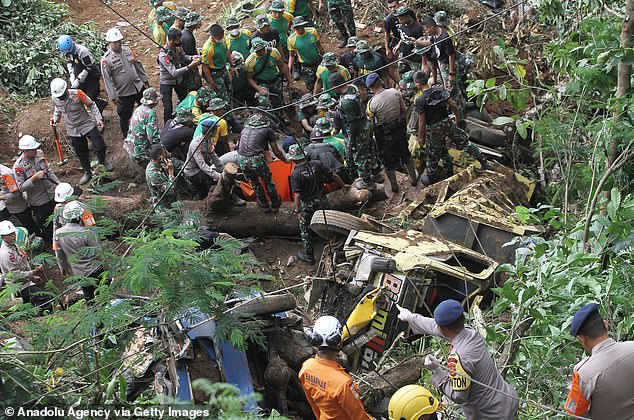





Joint SAR team members evacuate a victim of a landslide following the devastating earthquake in Cianjur on Tuesday
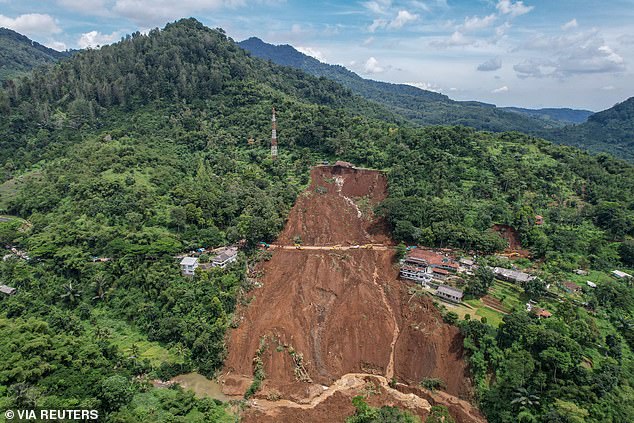





An aerial view of an area affected by landslides following earthquake hit in Cianjur, West Java province on Tuesday
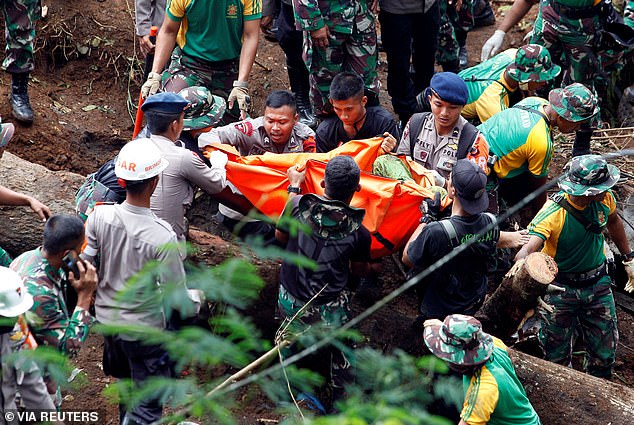





Rescuers today desperately searched for bodies and survivors in the rubble of buildings that collapsed in a devastating earthquake that killed at least 162 people. Pictured: Rescue workers carry the body of a victim in Cianjur on Tuesday
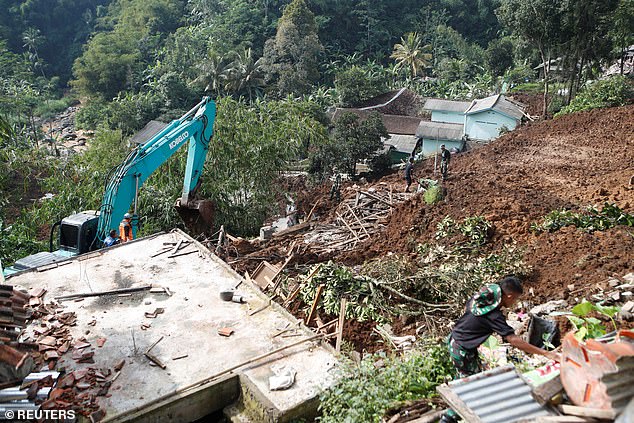





Excavators, trucks and other heavy equipment sent overnight reached the hardest-hit the city of Cianjur, around 45 miles south of the capital Jakarta
Cianjur police chief Doni Hermawan told Metro TV authorities had rescued a woman and a baby from a landslide but a third person they found had died of their injuries.
Initial rescue attempts were hampered by damaged roads and bridges and power blackouts, and a lack of heavy equipment to help move the heavy concrete rubble. By Tuesday, power supplies and phone communications had begun to improve.
Operations were focused on about a dozen locations in Cianjur, where people are still believed trapped, said Endra Atmawidjaja, the public works and housing spokesperson.
‘We are racing against time to rescue people,’ Atmawidjaja said, adding that seven excavators and 10 large trucks had been deployed from neighboring Bandung and Bogor cities to continue clearing trees and soil that blocked roads.
Cargo trucks carrying food, tents, blankets and other supplies from Jakarta were arriving early Tuesday in temporary shelters. Still, thousands spent the night in the open fearing aftershocks.
‘Buildings were completely flattened,’ said Dwi Sarmadi, who works for an Islamic educational foundation in a neighboring district.
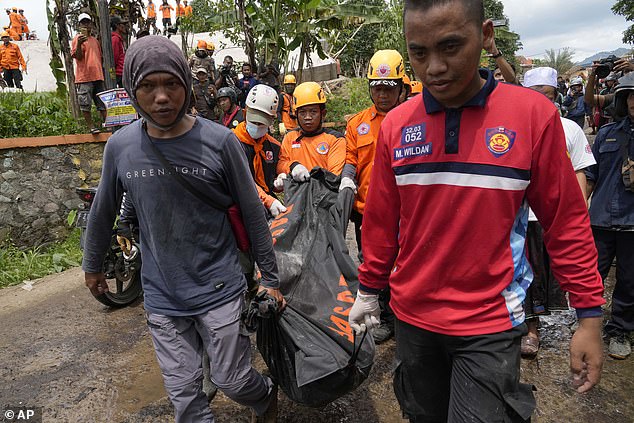





Rescuers carry the body of an earthquake victim recovered from under the rubble of a collapsed building in Cianjur on Tuesday
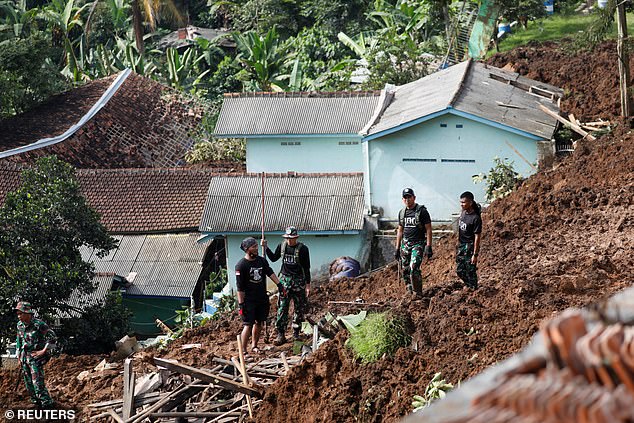





The quake triggered a landslide and collapsed buildings in hard-hit Cianjur – where most of the deaths were reported. Pictured: Indonesian Army officers stand as they evacuate people from the site of a landslide caused by the earthquake in Cugenang, Cianjur, on Tuesday
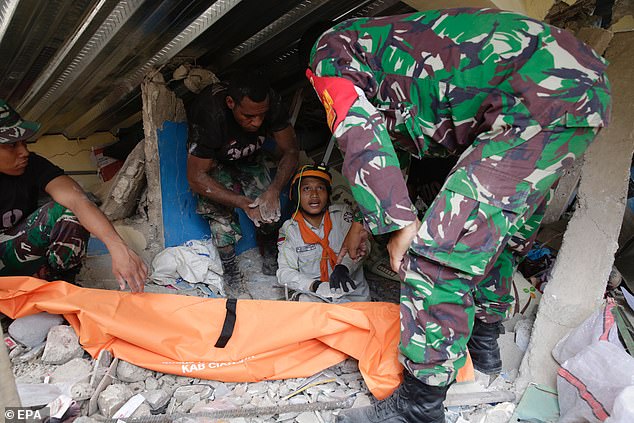





Indonesian military and rescue personnel search for victims at a collapsed house following the earthquake in Cianjur on Tuesday
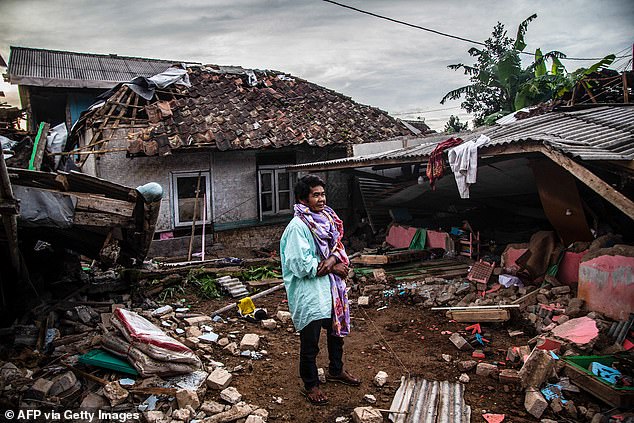





A villager looks at damaged houses following a 5.6-magnitude earthquake that killed at least 162 people, with hundreds injured and others missing in Cianjur on Tuesday
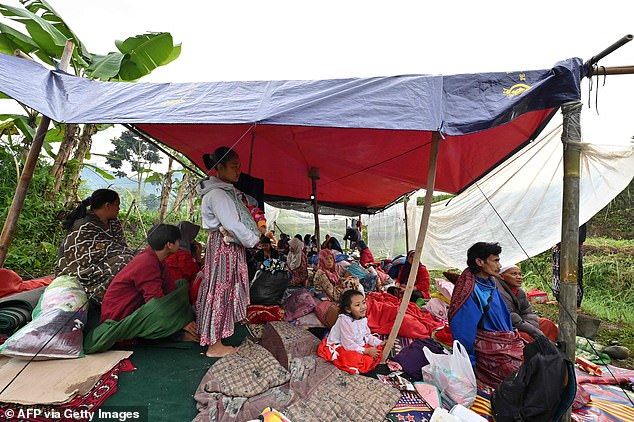





Women, men and children stay at a temporary shelter following a 5.6-magnitude earthquake that killed at least 162 people in Cianjur on Tuesday
President Joko Widodo on Tuesday visited Cianjur to reassure people of the government’s response in reaching those in need.
‘On behalf of myself and on behalf of the government, I would like to express my deep condolences to the victims and their families in this Cianjur earthquake,’ he said after visiting survivors in shelters on a soccer field.
He pledged to rebuild infrastructure, including the main bridge connecting Cianjur to other cities, and to provide the government assistance up to 50 million rupiah (£2,690) to each resident whose house was damaged.
Roughly 175,000 people live in Cianjur, part of a mountainous district of the same name with more than 2.5 million people.
Known for their piety, the people of Cianjur live mostly in towns of one- and two-story buildings and in smaller homes in the surrounding countryside
Kamil said that more than 13,000 people whose homes were heavily damaged were taken to evacuation centers. Outside the Cianjur Regional Hospital, hundreds waited for treatment.
‘I was working inside my office building. The building was not damaged, but as the quake shook very strongly, many things fell. My leg was hit by heavy stuff,’ Sarmadi said.
He was waiting near a tent outside the hospital after some overwhelmed clinics were unable to see him. Many people were coming in worse shape. ‘I really hope they can handle me soon,’ he said.
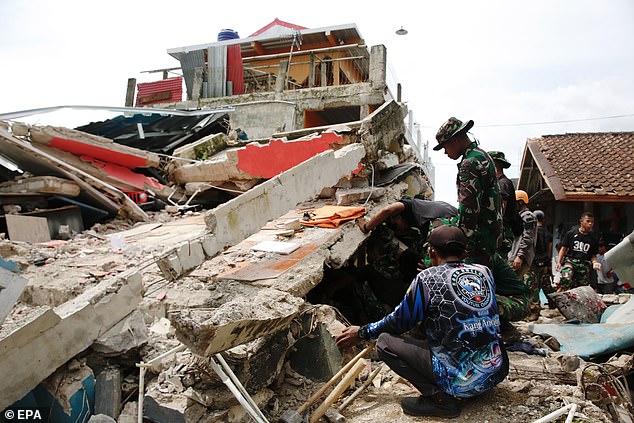





Indonesian military and rescue personnel search for victims at a collapsed house in Cianjur on Tuesday
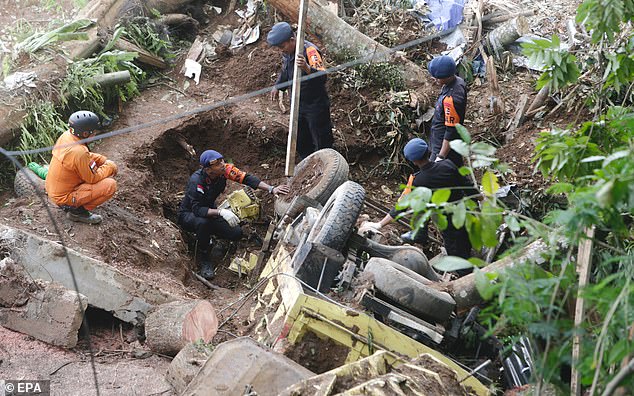





Indonesian policemen and rescue search for victims near a destroyed car in Cianjur on Tuesday
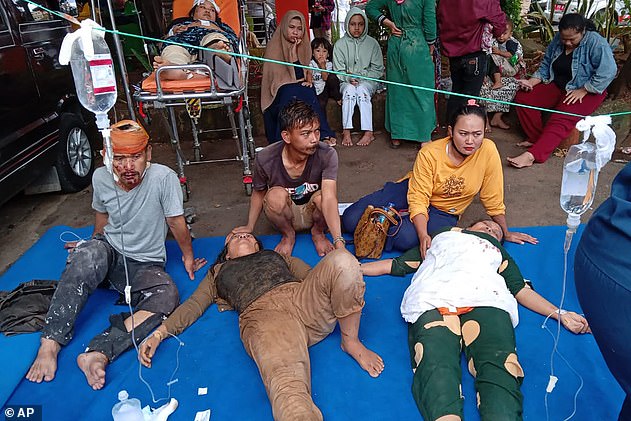





People wounded in an earthquake that struck near the town of Cianjur, in Indonesia, receive treatment in the car park of a local hospital after the ward was overwhelmed
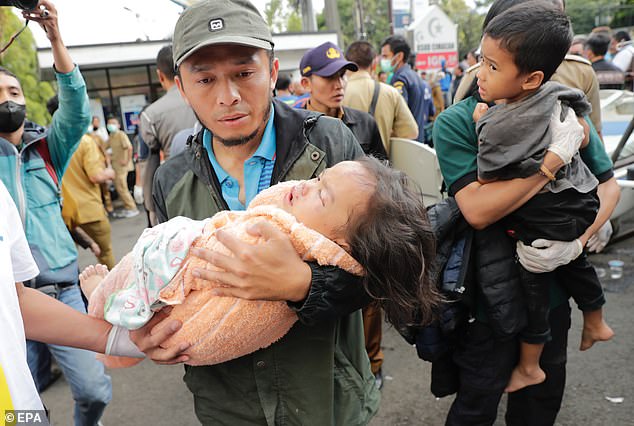





Rescuers carry an injured toddler through the streets of Cianjur after the earthquake
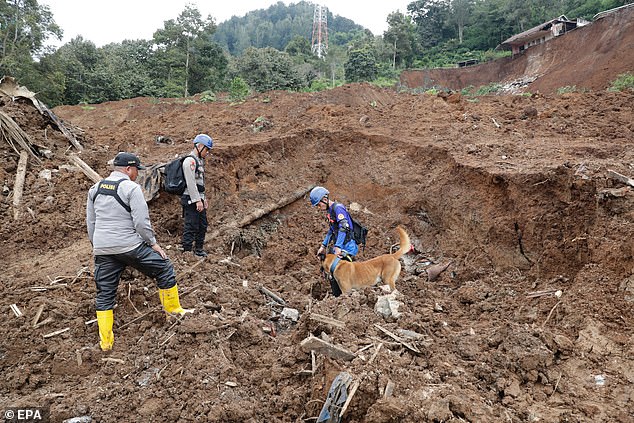





Indonesian policemen and rescue personnel hold K-9 dog as they search for victims from a landslide triggered by a 5.6 magnitude earthquake, in Cianjur, Indonesia, on Tuesday
Hasan, a construction worker who, like many Indonesians uses one name, was also one of the survivors who was taken to the hospital.
‘I fainted. It was very strong,’ Hasan recalled. ‘I saw my friends running to escape from the building. But it was too late to get out and I was hit by the wall.’
The quake struck at a depth of 10 kilometers (6.2 miles). It also caused panic in the greater Jakarta area, about a three hour-drive away, where high-rises swayed and some people evacuated.
Earthquakes occur frequently across the sprawling archipelago nation, but it is uncommon for them to be felt in Jakarta.
There were no reports of casualties or major damage in the capital of Jakarta, where people rushed out of buildings.
Mayadita Waluyo, a 22-year-old lawyer, described how panicked workers ran for the exits of their building in Jakarta as the quake struck.
‘I was working when the floor under me was shaking. I could feel the tremor clearly. I tried to do nothing to process what it was but it became even stronger and lasted for some time,’ she said.
‘I feel a bit dizzy now and my legs are also a bit cramped because I had to walk downstairs from the 14th floor.’
The country of more than 270 million people is frequently struck by earthquakes, volcanic eruptions and tsunamis because of its location on the arc of volcanoes and fault lines in the Pacific Basin known as the ‘Ring of Fire.’
In February, a magnitude 6.2 earthquake killed at least 25 people and injured more than 460 in West Sumatra province. In January 2021, a magnitude 6.2 earthquake killed more than 100 people and injured nearly 6,500 in West Sulawesi province.
A powerful Indian Ocean quake and tsunami in 2004 killed 230,000 people in a dozen countries, most of them in Indonesia.